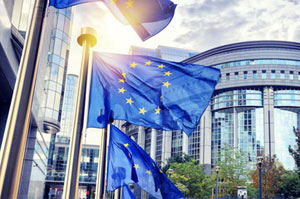



EU and US join Global Methane Pledge ahead of COP 26 conference
The European Union and United States have joined the Global Methane Pledge, an initiative to reduce global methane emissions that will be launched at the UN Climate Change Conference (COP 26) in November.President Biden and European Commission President Ursula von der Leyen urged countries at the US-led Major Economies Forum on Energy and Climate (MEF) to join the Pledge and welcomed those that have already signaled their support.

Methane is a potent greenhouse gas and, according to the latest report of the Intergovernmental Panel on Climate Change, accounts for about half of the 1.0 degrees Celsius net rise in global average temperature since the pre-industrial era. Rapidly reducing methane emissions is complementary to action on carbon dioxide and other greenhouse gases, and is regarded as the single most effective strategy to reduce global warming in the near term and keep the goal of limiting warming to 1.5 degrees Celsius within reach.
Countries joining the Global Methane Pledge commit to a collective goal of reducing global methane emissions by at least 30% from 2020 levels by 2030 and moving towards using best available inventory methodologies to quantify methane emissions, with a particular focus on high emission sources. Delivering on the Pledge would reduce warming by at least 0.2 degrees Celsius by 2050.
Countries have widely varying methane emissions profiles and reduction potential, but all can contribute to achieving the collective global goal through additional domestic methane reduction and international cooperative actions. Major sources of methane emissions include oil and gas, coal, agriculture, and landfills. These sectors have different starting points and varying potential for short-term methane abatement with the greatest potential for targeted mitigation by 2030 in the energy sector.
Methane abatement delivers additional important benefits, including improved public health and agricultural productivity. According to the Global Methane Assessment from the Climate and Clean Air Coalition (CCAC) and the United Nations Environmental Programme (UNEP), achieving the 2030 goal can prevent over 200,000 premature deaths, hundreds of thousands of asthma-related emergency room visits, and over 20 million tons of crop losses a year by 2030 by reducing ground-level ozone pollution caused in part by methane.
The European Union and eight countries have already indicated their support for the Global Methane Pledge. These countries include six of the top 15 methane emitters globally and together account for over one-fifth of global methane emissions and nearly half of the global economy.
The European Union has been taking steps to reduce its methane emissions for almost three decades. The European Commission strategy adopted in 1996 helped reduce methane emissions from landfilling by almost a half.
Under the European Green Deal, and to support the European Union's commitment to climate neutrality by 2050, the European Union adopted in October 2020 a strategy to reduce methane emissions in all key sectors covering energy, agriculture and waste. The reduction of methane emissions in the current decade is an important part of the European Union's ambition for reductions in greenhouse-gas emissions by at least 55% by 2030.
This year, the European Commission will propose legislation to measure, report and verify methane emission, put limits on venting and flaring, and impose requirements to detect leaks, and repair them. The European Commission is also working to accelerate the uptake of mitigation technologies through the wider deployment of "carbon farming" in European Union Member States and through their Common Agricultural Policy Strategic Plans, and to promote biomethane production from agricultural waste and residues.

Finally, the European Commission is supporting the United Nations Environmental Programme (UNEP) in establishing an independent International Methane Emissions Observatory (IMEO) to address the global data gap and transparency in this area, including through a financial contribution. IMEO will play an important role in creating a sound scientific basis for methane emissions calculations and delivering the Global Methane Pledge in this regard.
The European Union and eight countries have already indicated their support for the Global Methane Pledge:
- Argentina
- Ghana
- Indonesia
- Iraq
- Italy
- Mexico
- United Kingdom
- United States
The United States, the European Union and other early supporters will continue to enlist additional countries to join the Global Methane Pledge pending its formal launch at COP 26.



